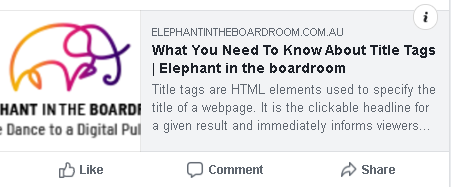
The Essential Guide For Perfect Title Tags
What is a Title Tag?
Title tags are HTML elements used to specify the title of a webpage. They are the clickable headlines that show up in the search results, telling the user clearly and succinctly what they can expect from the page. Below is what it looks like in your page’s source code.
< title>
What You Need To Know About Title Tags
< /title >
Where can I see the title tags?
Your title tags play an essential role in your SEO strategy. They show up in:
1. Search Engine Results Page (SERPs)
The core reason most businesses practice content marketing is to boost their rankings in the search engine results pages (SERPs). This is where people go to find information using keywords, the most popular of which include Google and Bing. To give you an idea, here’s what this blog will look like in the search results.

2. Social media
When someone shares your content on Facebook or Twitter, for example, the platform will generate a preview that will display your title tag as well. It includes information on what the page relates to, giving them an accurate idea of what they should expect if they decide to click through.

3. Web browser tabs
When you open a page on your browser, the title of the page will be displayed on the tab above. Modern web surfers tend to have more than one page open at a time, so this is a handy way for them to navigate and keep track. This is another good reason to make your title easily recognisable and distinguishable from other tabs that are open.

4. Browser bookmarks
When you bookmark a page, its title will be shown by default. If you open a new tab, you’ll see a condensed title on the browser’s Bookmarks Bar – so make sure to keep it short and sweet.

Why title tags are so important
Title tags basically signal to the search engine what content you have to offer. Here’s why you need to make them count.
First impressions last
You often hear that your website is a customer’s first impression of your brand. This technically isn’t true. To view your website, people must first click on your title tag. Make sure the words you choose persuade users to continue to your site. Remember, you’re competing with other websites with similar offerings, so make sure to differentiate yours with a punchy and interesting title tag that stands out of the crowd.
Increases click-through rate
Your title tag is make or break, so make sure it grabs peoples’ attention.
Relevance
Title tags tell the reader what your content is about and whether it is useful to them.
Keyword rankings
Title tags are a great home for target keywords. By using the right words in the right place, you can climb Google’s rankings over time. Even if it’s just a nudge, this could be the difference between appearing on page 2 and page 1.
Brand leverage
If you have authority as a trusted name in the industry, people will gravitate towards your brand. So make sure to showcase your business name in your title tag.
Search engine crawlers
Search engine crawlers also heavily rely on your title tags to understand what your page is about and when/where your website should appear in a search result. The more relevant your content is to your title tag, the higher your SEO ranking is likely to be.
How to write a good title tag
To entice your viewers to click on your title tag, it must be engaging. Try to use the categories below as a guide.
- Informational – top of the funnel search queries, “What is Title Tags”
- Comparison – middle of the funnel search queries, “Title Tags vs Meta Tags”
- Transactional – bottom of the funnel search queries, “Title Tag Optimiser”
- Navigational – “Gotch SEO” type of search queries; searcher knows your brand
Here are some tips for composing title tags that make an impact.
Prioritise the content
At the end of the day, SEO is all about strong content. So make sure there’s good quality behind your title tag. Otherwise, you’ll be guilty of clickbaiting which is very damaging to your brand.
Limit your title tag’s length
If your title is too long, search engines may cut it off and replaced it with ellipsis (…) which can result in the omission of important words. It is generally recommended to keep your titles under 60 characters long.
Use a unique title tag
Unique titles help search engines understand that your content is distinctive and valuable. It is also effective in driving higher click rates.
Position important keywords first
The simple act of placing important keywords closer to the beginning of your title tag can have a positive impact on your search rankings.
Speak the customer’s language
Good title tags are important for SEO, but remember that they are ultimately read by your audience, so make sure to prioritise them first. Your main goal is to attract clicks from your targeted audience so your title tags must appeal to them.
It takes thought, skill and practice to write good title tags. But once you get the hang of it, it can do wonders for your SEO.
Need help mastering title tags for your business? Contact our expert team at Elephant in the Boardroom today for a free digital consultation.



